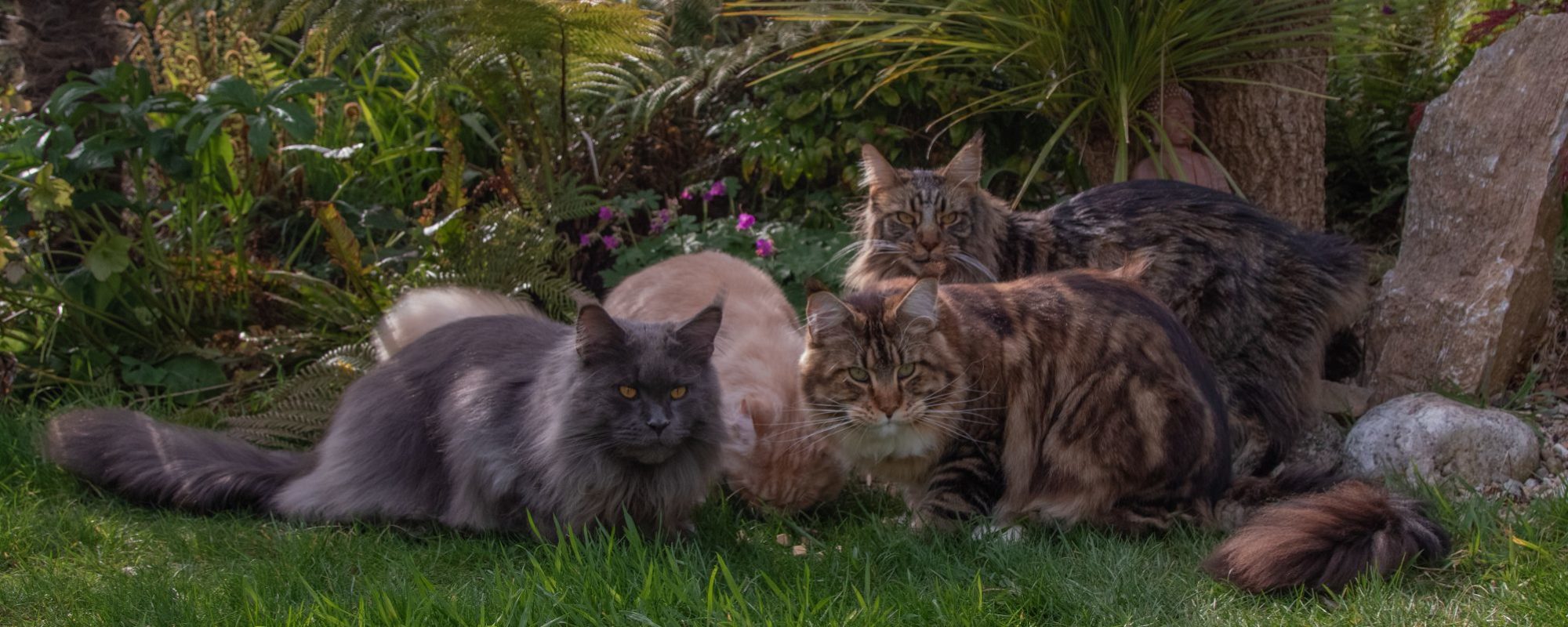Cats have varying incidences of health problems that may be genetic in nature. Pedigree cats, in particular, can be more prone to health issues as the gene pool is much smaller compared to your domestic house cat. Hence, it is of upmost importance that breeders reduce the likelihood of these diseases and health issues being passed on.
Problems that may affect the Maine Coon breed include the following:
Hip dysplasia (HD), which is a hereditary defect in the hip joint that in severe cases can cause lameness. A recent study determined its heritability, genetic correlation to body mass and response to selection. We follow the Pawpeds Health Programme that suggests that all breeding cats should be tested for HD before being used in a breeding programme in order to minimise HD in the breed.
Hypertrophic cardiomyopathy (HCM), a form of heart disease that is often inherited in Maine Coons. There is no cure for HCM. A DNA-based test is available to identify cats that carry one of the mutations that causes the disease. However, the gold standard are regular ultrasound check-ups of the heart. We follow the Pawpeds Health programme and besides genetically testing our cats for the mutations that can cause HCM, we also ultrasound scan our cats hearts by cardiologist vets in regular intervals because HCM can occur at any age and therefore a single normal echocardiogram (ultrasound examination of the heart) does not guarantee that the cat will remain free of the disease. We follow cardiologists recommendations that breeding cats should have an annual echocardiogram during their breeding years. We also (if possible) echo scan neuters and retired cats as this may allow the identification of older affected cats that have offspring in a breeding program.
Polycystic kidney disease (PKD), is a hereditary health condition, whereby a kitten is born with cysts in their kidneys. Cysts slowly increase in size during a cats lifetime, though signs and symptoms are often not evident until they reach 7 years old. Only one parent needs to be a carrier of this genetic defect, for it to be passed onto their offspring. Scientists claim polycystic kidney disease is the result of an autosomal dominant gene abnormality.
Spinal muscular atrophy (SMA), a genetic disorder that affects skeletal muscles of the trunk and limbs. It is a rare, but serious illness that will cause muscle wasting, instability and paralysis. A DNA test is available to identify carriers and affected kittens. The mutation is inherited as an autosomal recessive trait, meaning that two copies of the mutant gene are required for SMA to develop. Carriers with only one copy will be symptom free.
Pyruvate Kinase Deficiency (PK-Def) can lead to anemia in affected cats. Similar to SMA, for a cat to get sick it needs to receive one copy of the mutated gene from both parents. Carriers with only one copy will be symptom free.
Entropion, a condition which arises where the eyelid margins invert and hair or fur around the eyes contacts the corneal surface, causing chronic pain. Entropion has many causes. However, in young cats and kittens, entropion usually has a genetic, or breed related etiology. In Maine Coons, the anatomy of their head somewhat predisposes them to suffer from this condition. A broad head with high cheekbones, a big chin in combination with small and deep set eyes can increase the risk as this typically results in smaller/deeper eye sockets. We see Maine Coons as a moderate breed and try to avoid breeding for such extreme features.
FIV & FeLV. We regularly test our cats for both diseases.
We DNA test all our cats for PKD, PKDef, HCM and SMA through Langford Vets Diagnotics in the UK. In addition to that we follow the Pawpeds Health Programme and ultrasound scan our cats hearts in regular intervals, as well as hip score our cats via X-ray. As the gene pool for Maine Coons is limited, carriers for SMA and PK-Def can be used for breeding, however a carrier can only be mated to a non-carrier.
